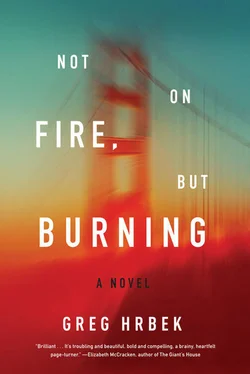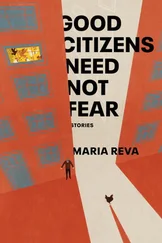As he slaps The Negro five, Dorian says to Plaxico: “I still say forget it.” The sentence is necessary to him, as a bridge is necessary to someone making a crossing. I still say forget it. Meaning that he gets Mr. N’s viewpoint — but the viewpoint, sensible though it may be, does not change the facts on the ground. The invitation didn’t say anything about other kids; it was therefore extended under false pretenses and accepted based on incomplete information. He is not refusing to go, but he wants it to be sayable later that he went into the whole thing having expressed, out loud and in the hearing of another, a doubt alike to non-consent. On the driveway stand the two adults, the mother in the head scarf and the father from the second car, who stop their talking as the boys approach. The mother, in a tone of pleasant surprise, says good morning. The father, who in sunglasses and Hawaiian shirt looks to Dorian like an Arab general on vacation, gives them a wordless look with implications difficult to divine, as if he has information about them which they don’t yet have themselves. An impression shared by both boys, who as a rule move through the world knowing just enough to formulate questions. The answers, it would seem, are always just out of reach. Like: Out in those camps — what’s been happening out there? Is it true, what some people say, about drones? Or: That photo from the other night, of my family before I was born. Someone took that picture. Someone is just outside the image. Not there yet there.
Is it her ?
Dorian hadn’t thought this at first. When he first saw the picture, sitting in the darkened den with his father, he had merely thought: California. My brother is two or three. But the image, the angle of its recording had positioned his mind’s eye, making him feel he was lying in the sand before his parents and brother, which made him think: the person with the camera was lying in the sand. Then, as the photo faded, he thought suddenly of her (if his brother was two, she would’ve been eight), and thought also of the other thing he’d noticed: the sunglasses on his mother’s face. The lenses were gigantic: two giant convex surfaces in which the reflection of the person in the sand, the person with the camera, might be visible. If he were to zoom the picture to two-fifty, maybe three hundred percent and look into the lenses … So Dorian had asked his father for a copy of the photo, and all the following day not receiving one finally wrote him an e-mail, What about the pic , to which the reply, What pic. Oh, that pic. I haven’t had time to look for that . Which is totally bogus because your father has nothing but time, does nothing all day but type on a computer after which he will spend the dinner hour moping because he hasn’t achieved anything worth shit all day. He knows why you want it. Just because your father is anti-social and self-centered doesn’t mean he’s not attuned to the action around him. On the contrary. He’s a writer. He sees plots everywhere. So why would he give you the photo. When he can remember perfectly well that she is the one who took it. He himself has probably thought about the sunglasses. Has maybe even done what he knows you would do if he gave you the picture; and has seen that you are right, that in the dark lenses (perhaps in one more clearly than the other) it is discernible: the reflection of a girl, eight or nine years old, lying in the sand with a camera.
“The boyz from the hood!”
“Hi, Mr. B.”
“Marhaban, marhaban,” he says. “That’s ‘welcome’ in Arabic.”
At the far end of the patio their neighbor is wearing a cook apron that says GRILL MASTER — THE MAN, THE MYTH, THE LEGEND. The other kids are buds. Hanging close, elbows rubbing. Karim standing off a little, against the house, in a scalene triangle of shade. ( Two of us , Dorian thinks, and four of them .) Then the sliding door opens and a girl steps out: a black girl never before seen by Dorian. She has apparently been in the bathroom checking her phone and applying lip gloss because there’s a phone in her hand and her lips have got the luster of hard candy.
“Oh,” she says. “Who’s this?”
Karim (sort of clearing his throat): “They live here.”
“I’m Zeb,” Plaxico says.
“Dorian.”
“The boyz from the hood,” Mr. B reiterates.
“I’m Khaleela.”
“Cool name,” Plaxico says. “Is it African?”
When she shakes her head, her shoulder-length braids swing with the slow grace of trapezes: “Khaleela was the wife of the prophet.”
“You mean,” Dorian says, “like a prophet from the Bible.”
“Um, no. The Koran.”
Once introductions are completed (the boys of Arab descent are named Omar, Tarriq, and Joey), the kids head for the swimming pool while the adoptive father withdraws to the kitchen in his cook apron and readies a banquet of snacks and meats. Under the transparent dome, which covers the entirety of the twenty-foot-long oval pool like a ballistic missile shield, the children do cannonballs, trying to splash the dome and scare cicadas off the outer surface. They have a semblance of a conversation (“How many bugs up there?” “Two hundred, five hundred”) while in the kitchen, the old soldier is impaling chunks of lamb and chicken on metal skewers. From this distance, the scene under the dome is one of fun and friendly relations — and the orphan boy, though perhaps on the outskirts, is not outside of it all. It’s the girl who won’t let him separate or isolate. Showing him something on her phone. Volleying a hot pink beach ball. The girl is like a butterfly, alighting on each male faction in a flight pattern that seems both random and carefully planned … She gets on the giant yellow smiley face and floats in the center of everything, sunglassed, head back, counting the insects aloud. “86, 87, 88.” The kid named Omar submerges, approaches sea-monstrous from below, and capsizes her. She surfaces, choking and spitting, shaking water from her braids, blinking her huge bright eyes; and cries, “I need mouth to mouth!” When she catches the boy looking at her — the white-skinned one, the only white one, who has a cool cowlick at the front of his hairline — she rolls her eyes and puffs her cheeks out like a blowfish. The boy ducks under the water. Holds his breath and opens his eyes. He can see her legs and feet; toes touching the bottom of the pool, just barely, lifting, touching again; and even under the water, he can hear the cicadas chorusing in the trees above and all around them. Dampened by water, the noise sounds like something other than itself. What is it? Then it comes to him. That tone played on the radio. That cold musical note meaning the next emergency can come at any moment.
I swam underwater to the ladder and climbed out. Plaxico was sitting on a lounge chair, drinking a soda and tapping his feet to that song that goes: Seasons don’t fear the reaper, nor do the wind the sun or the rain … I was going to say, Let’s bail. (Because all these Muslims kept looking at me like they knew I was the one, the kid from the public school who’d come to their mosque and written that thing in the boys’ bathroom, got suspended, got forced to take a class about hate speech, and then dragged back to the scene of the crime to apologize and paint over the words.) But before I could say anything, the girl was coming with her phone. Her skin wet like with dew. Saying: “Omar, take a picture of us.” Then she squeezed between me and Plaxico. Our bare legs were touching, the thighs and calves and even our feet a little, and all of her felt wet and warm.
“Take a couple shots.”
“Okay,” Omar said. “But you, what’s your name again?”
Читать дальше












